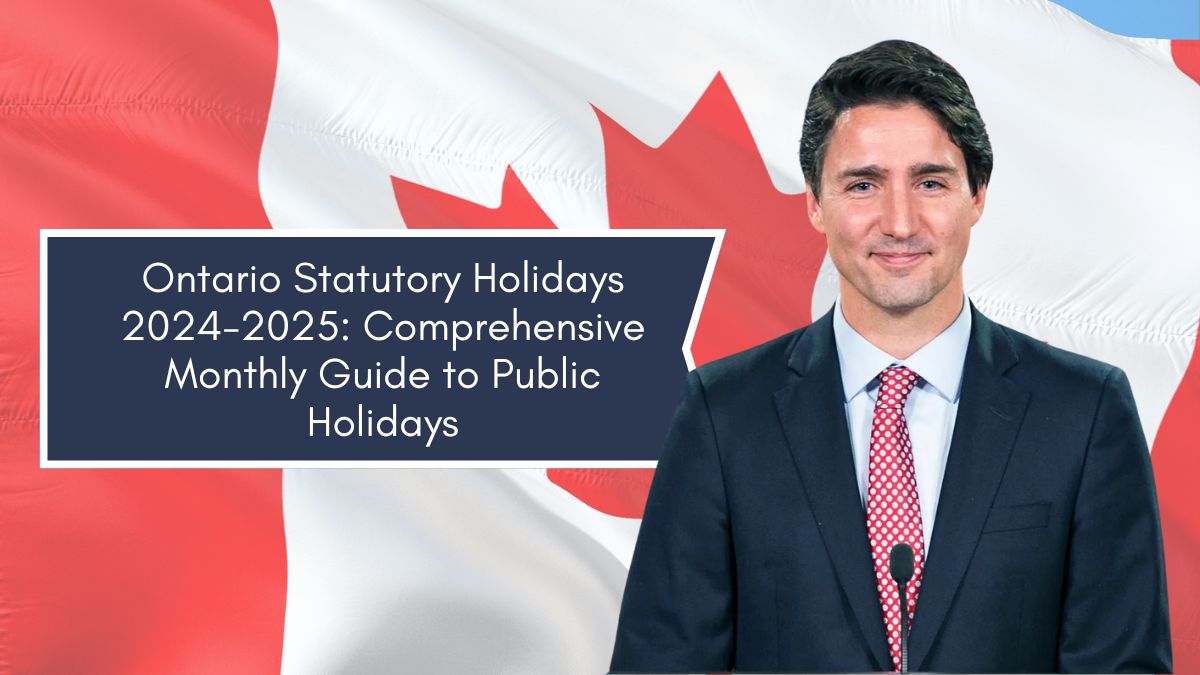Statutory holidays, often referred to as stat holidays, play a pivotal role in Ontario’s labor laws. They ensure employees have designated time to rest, celebrate, or receive additional compensation when working on these significant dates.
This guide delves into Ontario’s key statutory holidays for 2024 and 2025, explains holiday pay calculations, and outlines the rules for those working on these special days. Whether you’re an employee or employer, this resource provides essential clarity.
Understanding Ontario’s Statutory Holidays
What Are Statutory Holidays?
Statutory holidays are official government-designated days when employees are entitled to a paid day off. If employees are required to work on these days, they typically receive premium pay. In Ontario, there are nine widely recognized statutory holidays. However, holidays like Remembrance Day and Civic Holiday (the first Monday in August) are not statutory holidays but may be observed by some employers.
Ontario’s Statutory Holidays for 2024 and 2025
Here is a detailed list of Ontario’s statutory holidays for 2024 and 2025, along with their pay requirements:
| Holiday | Date in 2024 | Date in 2025 | Pay Requirement |
|---|---|---|---|
| New Year’s Day | January 1, 2024 | January 1, 2025 | Paid day off or premium pay if working |
| Family Day | February 19, 2024 | February 17, 2025 | Paid day off |
| Good Friday | March 29, 2024 | April 18, 2025 | Paid day off or premium pay if working |
| Victoria Day | May 20, 2024 | May 19, 2025 | Paid day off |
| Canada Day | July 1, 2024 | July 1, 2025 | Paid day off |
| Labour Day | September 2, 2024 | September 1, 2025 | Paid day off |
| Thanksgiving Day | October 14, 2024 | October 13, 2025 | Paid day off |
| Christmas Day | December 25, 2024 | December 25, 2025 | Paid day off |
| Boxing Day | December 26, 2024 | December 26, 2025 | Paid day off |
Statutory Holidays in 2024
The statutory holidays in Ontario for 2024 include:
- New Year’s Day: January 1 (Monday)
- Family Day: February 19 (Monday)
- Good Friday: March 29 (Friday)
- Victoria Day: May 20 (Monday)
- Canada Day: July 1 (Monday)
- Labour Day: September 2 (Monday)
- Thanksgiving Day: October 14 (Monday)
- Christmas Day: December 25 (Wednesday)
- Boxing Day: December 26 (Thursday)
Statutory Holidays in 2025
Looking ahead to 2025, the statutory holidays are as follows:
- New Year’s Day: January 1 (Wednesday)
- Family Day: February 17 (Monday)
- Good Friday: April 18 (Friday)
- Victoria Day: May 19 (Monday)
- Canada Day: July 1 (Tuesday)
- Labour Day: September 1 (Monday)
- Thanksgiving Day: October 13 (Monday)
- Christmas Day: December 25 (Thursday)
- Boxing Day: December 26 (Friday)
How Is Statutory Holiday Pay Calculated?
To qualify for statutory holiday pay, employees must adhere to the “first and last rule”, meaning they need to work their scheduled shifts before and after the holiday unless they have a valid reason for being absent.
Formula for Holiday Pay Calculation
Holiday pay is determined by averaging the earnings from the previous four weeks and dividing it by 20. This ensures fair compensation, even if employees don’t work on the holiday itself.
For instance:
- Weekly Earnings: $20/hour × 40 hours = $800
- Four-Week Total: $800 × 4 = $3,200
- Holiday Pay: $3,200 ÷ 20 = $160
Working on a Statutory Holiday
Employees required to work on statutory holidays are entitled to premium pay (usually 1.5 times their regular hourly rate) in addition to their holiday pay. Alternatively, employers may offer a substitute day off later in the year.
Example: Premium Pay Calculation
- Hourly Rate: $20
- Hours Worked: 8
- Premium Pay: 1.5 × $20 × 8 = $240
Adding regular holiday pay brings the total earnings for the day to $400.
Statutory Holidays Falling on Weekends
When a statutory holiday coincides with a weekend, employees are still entitled to holiday pay. Employers can either:
- Offer a substitute day off with pay, or
- Provide holiday pay for the actual holiday.
This arrangement typically depends on company policy or agreements between employers and employees.
FAQs
What is the “first and last rule” for statutory holiday pay?
The “first and last rule” means that employees must work their scheduled shifts immediately before and after the holiday to qualify for holiday pay unless they have a legitimate reason for being absent.
Are employees entitled to statutory holiday pay if they don’t work on the holiday?
Yes, as long as they meet the eligibility criteria, including the first and last rule.
What is premium pay for working on a statutory holiday?
Premium pay is compensation at 1.5 times the regular hourly rate for employees who work on a statutory holiday.







